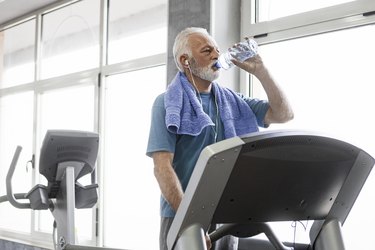
Creatinine is a waste product formed when creatine -- a protein found primarily in your muscles -- is broken down in your body. Your kidneys are responsible for eliminating the majority of this waste product, so blood creatinine levels are frequently used as an indicator of kidney function. If your creatinine level is too high, this often means your kidneys are not working well. Less commonly, high creatinine levels are due to other medical conditions, certain medications or excessive intake of certain foods.
There are several things you can do to improve your creatinine level. Ask your doctor which are most appropriate for you.
Video of the Day
Video of the Day
Reduce Your Animal Protein Intake
Foods containing large amounts of animal protein, such as red meat and poultry, are rich in creatine. Heat during the cooking process causes the creatine to break down into creatinine. When these foods are consumed, the creatinine is absorbed from your digestive tract into your body, raising your creatinine level. Reducing the amount of animal protein in your diet may be one way to improve your creatinine.
Increase Your Fluid Intake
Dehydration may increase creatinine levels, so increasing your fluid intake will help avoid dehydration and possibly improve your creatinine. According to the Mayo Clinic, drinking eight 8-oz glasses of water each day is a reasonable goal that is appropriate for many people. But talk to your doctor about what type and amount of fluids are best for you. If your kidneys are not working well or if you have certain other medical conditions, your doctor may have special recommendations.
Improve Your Urinary Tract Health
Some treatable urinary tract conditions -- such as kidney infections and blockages in the urinary tract -- can elevate creatinine levels by reducing creatinine removal through the urine. Blockages may have a number of causes, including stones, tumors and an enlarged prostate.
Treating these conditions may improve your creatinine level. Kidney infections are treated with oral and sometimes intravenous antibiotics. Urinary tract blockages may require special procedures or surgery, depending on the cause.
Control Your Blood Pressure and Blood Sugar
Hypertension -- high blood pressure -- and diabetes may cause kidney disease by damaging blood vessels leading to and within the kidneys. Controlling your blood pressure and blood sugar may help improve your creatinine level or at least prevent it from becoming worse.
Following a heart-healthy, low-sodium diet and getting plenty of exercise are ways to improve your blood pressure. Exercise and dietary changes will also help control your blood sugar. If you are taking any medications for hypertension or diabetes, follow all of your doctor's instructions exactly.
Ask About Your Medications
A number of medications can increase your creatinine level. Some act by causing actual kidney damage. Others interfere with the ability of your kidneys to eliminate creatinine, but they do not damage the kidneys. Still other medications simply interfere with the way the lab measures creatinine levels -- they do not affect the actual amount of creatinine in your body. Ask your doctor whether changing your medications may improve your creatinine level.
Beware of Creatine Supplements
Like creatine-rich foods, some creatine supplements are broken down to creatinine in your digestive tract. The creatinine is then absorbed into your body, raising your creatinine level. According to the authors of an article published in "The Netherlands Journal of Medicine" in February 2011, creatinine levels only seem to increase with the creatine ethyl ester type of supplements.
Reviewed by Mary D. Daley, M.D.
- Mayo Clinic: Water -- How Much Should You Drink Every Day?
- Mayo Clinic: Creatinine Test
- Merck Manual Profesional Version: Obstructive Uropathy (Urinary Tract Obstruction)
- The Netherlands Journal of Medicine: Elevated Plasma Creatinine Due to Creatine Ethyl Ester Use
- The Permanente Journal: False Estimates of Elevated Creatinine
- StatPearls [Internet]: Renal Function Tests
Is this an emergency? If you are experiencing serious medical symptoms, please see the National Library of Medicine’s list of signs you need emergency medical attention or call 911.